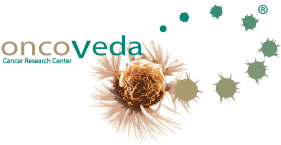Research
Biomarkers
The biomarker development in Oncoveda is dedicated to the discovery, validation, and marketing of biomarker assays for the diagnosis, monitoring, and treatment of cancer.
Bladder Cancer
We are currently conducting a multi-center clinical trial to determine the effectiveness of a urine DEK ELISA in initial diagnosis of patients with transitional cell carcinoma of the bladder.
The DEK protein is over expressed in numerous cancers including bladder cancer, melanoma, hepatocellular carcinoma, glioblastoma, lung cancer and cervical cancer. Chromosome 6p22 gains in retinoblastoma, bladder cancer and melanoma, suggests DEK gain of function may provide selective advantage for tumor development. Using urine samples from patients with bladder cancer and other malignant and nonmalignant urogenital diseases, our data indicates that DEK protein is found in the urine of bladder cancer patients and serves as a marker for bladder cancer.
Endometrial Cancer
We are currently conducting a clinical research study in collaboration with a local university hospital to identify novel and non-invasive biomarkers for the diagnosis of endometrial adenocarcinoma, the most common urogenital cancer affecting females in the United States.
We are looking for clinicians in oncology who may be interested in initiating a future collaboration to identify novel diagnostic markers, prognostic markers, and/or biomarkers to stratify patients for treatment efficacy. Please contact jtrama@oncoveda.com or lrice@oncoveda.com for more information.
Drug Targets
The research and assay development in Oncoveda is dedicated to the identification, validation, and screening of therapeutic targets to identify small molecules that will be efficacious for the treatment of cancer. In collaboration with our sister company, Venenum Biodesign LLC, we develop high throughput screens (HTS) to identify inhibitors for our targets of interest utilizing our 6 million compound library.
Prevention of Aberrant Gene Expression in Tumors
As cells become cancerous, gene expression becomes deregulated and leads to increased cell growth and metastasis. We have completed a high-throughput screen to identify inhibitors of a histone demethylase that is highly upregulated in multiple types of cancers and promotes the expression of oncogenes while simultaneously repressing multiple tumor suppressor genes. Inhibition of this histone demethylase has been shown to slow tumor growth. Additionally, we have developed a high-throughput assay to identify inhibitors of a histone methyltransferase, which promotes oncogene expression and has been validated as a target for multiple malignancies.
Inhibition of Metastasis
One pathway that is often upregulated in difficult-to-treat cancers, such as TNBC, is the Wnt signaling pathway. Activation of Wnt signaling leads to increased oncogene expression and promotes changes in cell morphology that leads to cell migration from the initial tumor site – or metastasis. We are developing a high-throughput screen to identify inhibitors of Wnt signaling that could decrease tumor growth and the incidence of metastasis.
Inhibition of NF-κB
NF-κB activity is a target of B cell and T cell receptor signaling that promotes cell proliferation and cancerous phenotypes. We are developing a high-throughput assay to identify inhibitors of an enzyme in this pathway that plays several key roles in NF-κB signaling.
Immuno-Oncology
Historically, cancer has been treated with combinations of surgery, radiation, and chemotherapy. In the last decade, immuno-oncology has emerged as a promising new treatment strategy. Immuno-oncology is described as using the body’s own immune system to fight cancer. Our goal is to develop small molecules that will enhance checkpoint and co-stimulatory immunotherapies to efficiently and specifically eradicate tumors.
Checkpoint Immunotherapies
Although the body’s own immune system is capable of fighting cancer, this process is actively suppressed by tumors in a variety of ways. Recent clinical breakthroughs have been demonstrated with immune checkpoint inhibitors, a class of therapeutics that release active, tumor-induced immune suppression and allow the immune system to progress through checkpoints and eradicate the tumor. We have several programs designed to identify small compounds that inhibit T-cell mediated, tumor-induced immunosuppression. We foresee that these inhibitors will be the key to using immune checkpoint inhibitor therapy successfully in melanoma and the common epithelial malignancies.
Co-Stimulatory Immunotherapies
Indeed, the restoration of anti-tumor immunity has shown clinical promise with immune checkpoint inhibitors. However, many patients cannot benefit from checkpoint immunotherapies. Although these therapies may effectively remove the “brake” of the immune system, a successful anti-tumor response needs to engage the “accelerator” of the immune system also. We have several programs designed to identify and develop small compounds that will induce type I interferons that underlie immune surveillance. We foresee that inducing an appropriate interferon response will not only reduce the primary tumor, but may also reduce metastases and create long-term immunologic memory against tumor growth.
Research Projects for Internships and/or Student Rotations
Oncology Drug Target Assay Development
Currently, our laboratory is developing assays to find inhibitors for multiple targets. The hope is that the inhibitors we discover will be developed into cancer therapeutics that provide better treatment options for patients. While many of our programs focus on well-validated drug targets, we continue to validate other targets for eventual assay development and high-throughput screening. We have a long-standing interest in understanding the biology of Protein Phosphatase 2A, a tumor suppressor, and its inhibitors to identify targetable enzymes and/or protein interactions to identify novel therapeutics. A rotation or internship in our laboratory would give you experience in tissue culture techniques and cell-based assays, such as trans-well migration assays, that monitor the ability of cells to migrate. You may also gain experience with techniques such as western analysis, immunoprecipitation, PCR, and reporter assays.
Latest News
Updated Website! - The Oncoveda website has been fully updated! Please take a moment to learn about our current programs and scientific members!
Projects for Lab Rotations/Internships within Oncoveda - Please access the Research Page (link above) to learn about the lab rotation/internship projects that are currently available in Oncoveda.
Article Accepted into Tumor Biology - Our article further describing the role of PME-1 in endometrial cancer tumor progression titled "Inhibition of Protein Methylesterase 1 decreased cancerous phenotypes in endometrial adenocarcinoma cell lines and xenograft tumor models" has been accepted for publication in Tumor Biology.




